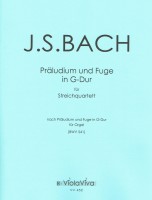
The career of the young violist Hélène Clément |
Niklaus Rüegg - The British magazine Gramophone is calling the Doric String Quartet «one of the finest young string quartets» and praises its members as «musicians with fascinating things to say». The quartet performs at the most renowned concert venues worldwide. Countless prizes and awards underline a highly successful career.
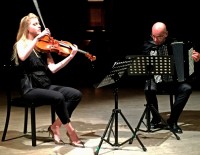
the accordionist Teodoro Anzellotti.
I was able to meet Mrs. Clément as part of the 4. Mizmorim Festival in Basel, and interview her about the relation with to instrument, and about performing as part of a highly successful quartet.
During the same week of the festival, the string quartet also performed in Memmingen, Germany, and in Rapperswil. Following the intense performance
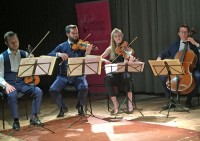
at home.
The artists have been signed with label Chandos in 2010. Every year they record one or two CDs, focussing on one composer at a time, including Haydn, Schubert, Schumann, Chausson, Korngold, Janáček, Martinů and Walton. They've been nominated twice for the Gramophone award.
www.doricstringquartet.com
Congratulations to your concert weekend in Basel, Hélène! Your ensemble's performance was wonderful!
Thank you!
The Mizmorim Festival concert series are known for featuring topnotch artists...
Indeed, Michal Lewkowicz, the festival director, holds great ties in the music world. She creates the program with the artists in mind, so most of them are featured in various performances. It's been our third time participating at the festival, after our 2015 and 2017 appearances. It's been an intense time, but I've definitely learnt a lot.
The Doric String Quartet is a leading UK string quartet ensemble. You are performing worldwide and with great
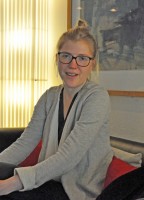
but I learned a lot of
new things.»
The quartet was founded twenty years ago already, by the fifteen years old Alex Redington (1st violin) and John Myerscough (cello). Soon thereafter, a second violinist (Jonathan Stone) joined. I was invited four and a half years ago. The quartet had always been performing more abroad than in the UK. Over the past three years, there's been a lot of progress. There are a lot of booking requests today, and we are able to choose our own concert programs.
Chamber music has become very popular over the last years. How's the competition for quartets?
Indeed, chamber music is experiencing a boom. It is unbelievable, how many young people are interested in chamber music today. This trend has grown significantly over the last few years.
How did you come to playing viola? Or did the viola come to you?
(Laughs) Both. I always wanted to play the viola. I started at the age of eight, and always stayed with it. I grew up in a family of musicians. My father plays organ, my mother plays oboe and my grand mother was a violinist. I wanted to play a similar instrument as her, yet not the same.
What does the viola mean to you personally?
Composers did their best when writing viola parts in chamber music. However there was a time in my career when I was unclear about which music I wanted to play. My self-image was a secondary matter during that time. Today, the desire to play chamber music is my priority.
The viola plays a support role in both, chamber music and orchestra. It rarely takes the spotlight...
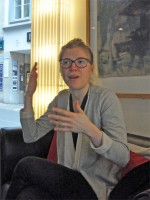
has been an increase in the
enquiries and we can
determine our programs
ourselves»
Yes, that is true, however I love to play the middle part. I love this kind of interaction. Our quartet focusses on making music together. We work in a democratic manner. We don't just follow the first violin, on the contrary, Alex plays very light and transparent, and blends into the quartet sound just as we do.
May the viola be compared to the cello, for it contains the same type of strings?
For me personally, a viola should never sound like a cello. It shouldn't wield the power of a cello, but be distinct through its unique, transparent tone. Especially in a quartet, this special timbre is very important, since it needs to sound distinct from the other instruments. My favorite string is the A string. It has a characteristic, dominant sound.
Which viola model to you play today?
I am playing a new instrument, built in 2008 by Stephan von Baehr. He works in Berlin and Paris and creates topnotch, artist tailored violins, violas and cellos. My instrument sounds exactly like the sound I've been after. Von Baehr also customized the fingerboard for my hands. He has a great ear and feels the artists needs. Mutual trust plays a key role here.
Where did you start out, and where did you study?
I am originally from Clermont-Ferrand. That's where I started taking lessons. Later on I visited a conservatory close to Paris, then the Conservatoire National Supérieur. During this time I took lessons with Hariolf Schlichtig in Munich, whom I owe important creative impulses. I then studied with Tabea Zimmermann in Berlin, for two years. During this time I performed a lot of chamber music in France, Germany and America, and also played as an extra violist in various orchestras, such as the Gewandhaus.
Can you describe a "typical" day of your life?
As a quartet, we usually practice four hours a day, after which I continue practicing at home for two hours. I also teach at the Royal Academy of Music. There's usually not a lot of time for a private life.
You travel a lot. How do you keep up with your commitments?
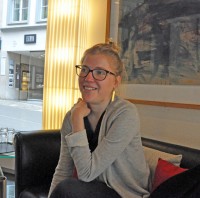
I wanted to do something like that.
but not the same.»
We adhere to our own strict rules: We never leave for longer than 14 days in a row. Off days are important as well. During summer, we frequently take a couple weeks off. My fellow quartet members have their own projects and ensembles, and some of them have family too; strategic planning is key.
Do you like making recordings?
Yes, very much so. It is important to enjoy the experience, and to have fun. If any ensemble member is in a bad mood, that makes recording impossible. We are very happy with our CD label Chandos. They let us make most repertoire decisions.
You've been called to the Royal Academy of Music in London, to teach quartet performance. Who does this work?
We teach blocks during a few Sundays per semester. Everybody teaches separately, and at the end of the day, students present what they've learned in a concert. I very much like teaching, and the young generation is very committed. The level has risen considerably over the last years. Since last year, I also teach a few private lessons. It's a great way for me to keep growing, since I always have to put myself into the student's situation. I always aim to be encouraging and give room to individual development.
Hélène, thank you for your time, I wish you all the best of success for your upcoming concerts!
Add comment

Niklaus Rüegg
The new viola blog is written by Niklaus Rüegg, graduate of the Zurich International Opera Studio, graduate of the Basel Opera Academy, twice winner of the Migros Gifted Scholarship, numerous engagements in opera, operetta, musicals and concerts in Switzerland and abroad.
Rüegg has also been working as a music journalist for ten years and is responsible for the association pages of the VMS (Verband Musikschulen Schweiz) in the Schweizer Musikzeitung.
As a young man, Niklaus Rüegg had played the violin and viola.
Photos: Niklaus Rüegg.
Onlineshop |
Johann Sebastian Bach - Prelude and Fugue in G major for string quartet
» To the String quartet
Violablog |
Our viola blog in an overview with pictures and short texts.
» To the Violablog overview
Newsletter |
 Do you don't want to miss any news regarding viola anymore? Our newsletter will keep you informed.
Do you don't want to miss any news regarding viola anymore? Our newsletter will keep you informed.» Subscribe to our Newsletter for free
|
|
 Visit and like us on Facebook.
Visit and like us on Facebook.» Music4Viola on Facebook
